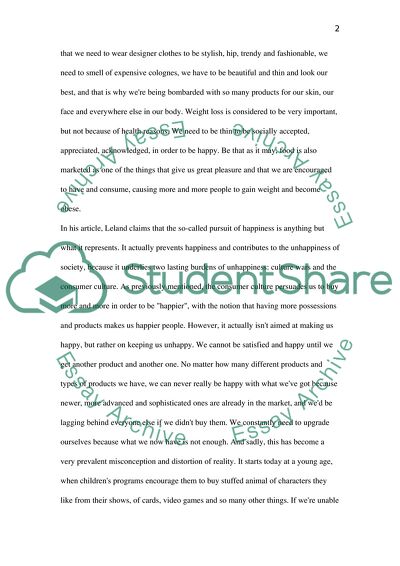
- Home
- Free Samples
- Premium Essays
- Editing Services
- Extra Tools
- Essay Writing Help
- About Us
- Studentshare
- Subjects
- Miscellaneous
- Pursuing Happiness
Pursuing Happiness - Essay Example

- Subject: Miscellaneous
- Type: Essay
- Level: Masters
- Pages: 4 (1000 words)
- Downloads: 0
- Author: tremblayaddison
Extract of sample "Pursuing Happiness"
To him and his counterparts, happiness was "to be at peace under your vine and fig tree with none to make you afraid" (Leland, 2003). In other words, happiness at that time simply meant living in peace, feeling secure and safe, content with what you have, your current situation. Contrary to this, we view happiness today as pleasure, enjoyment, fun, excitement and so on. But we took it another step forward, and placed the main emphasis on carnal pleasures or material wealth. Instead of relating to it as being happy with oneself, content with what we have, appreciative and thankful of what weve got, striving to improve ourselves, be kind to people and basically live peacefully and harmoniously, we are being motivated to base our happiness on sexual enjoyments as well as obtaining more and more objects, possessions, money, houses, cars and so on and so forth.
This is clearly not suitable with the earlier definition of happiness as existed in Jeffersons time. Today, ad agencies, people who are responsible of commercials and marketing such a wide assortment of products in our society, are responsible for our defining of happiness as the obtainment of products. The common rationale today is that we need to wear designer clothes to be stylish, hip, trendy and fashionable, we need to smell of expensive colognes, we have to be beautiful and thin and look our best, and that is why were being bombarded with so many products for our skin, our face and everywhere else in our body.
Weight loss is considered to be very important, but not because of health reasons. We need to be thin to be socially accepted, appreciated, acknowledged, in order to be happy. Be that as it may, food is also marketed as one of the things that give us great pleasure and that we are encouraged to have and consume, causing more and more people to gain weight and become obese. In his article, Leland claims that the
...Download file to see next pages Read MoreCHECK THESE SAMPLES OF Pursuing Happiness
The Concept of Personal Freedom
Should Adultery be illegal
Defense of the Right of Privacy in the US
Character Analysis of Silas in Richard Wright's Long Black Song
Quotation Q and Human Rights
Kate Chopin's The Awakening
Computers and the Pursuit of Happiness by David Gelernter
The Global Issues: The Ones Who Walked Away from Omelas and Pilgrim at Tinker Creek

- TERMS & CONDITIONS
- PRIVACY POLICY
- COOKIES POLICY